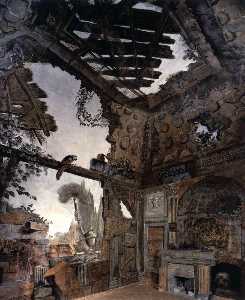Charles Louis Clerisseau
Charles Louis Clerisseau
Born: 1721
Death: 1820
Biography:
Early Life and Education
Charles Louis Clerisseau, a French architect, draughtsman, antiquary, and artist, was born on August 28, 1721, in Paris. He began his education under the tutelage of architect Germain Boffrand. In 1746, he won the Premier Prix de Rome, which included a scholarship to study at the French Academy in Rome.
Time in Rome and Influence
During his time in Rome (1749-1755), Clerisseau befriended notable artists Giovanni Battista Piranesi and Claude-Joseph Vernet. In 1752, they collaborated on a sketching tour of Hadrian's Villa at Tivoli. His final months at the Academy were marked by a dispute with Director Charles-Joseph Natoire.
Collaboration with Robert Adam and Neoclassical Architecture
In 1755, Robert Adam arrived in Florence, where he met Clerisseau. They collaborated on documenting the ruins of Diocletian's Palace at Split, which was published in Adam's Ruins of the Palace of the Emperor Diocletian at Spalatro (1764). Most engravings are believed to be the work of Clerisseau, although he received no credit.
Return to Paris and Legacy
Upon his return to Paris in 1767, Clerisseau became a magnet for young neoclassical architects. His influence extended to Russia, England, and the United States, with clients including Catherine the Great and Thomas Jefferson. Clerisseau's work played a key role in shaping the neoclassical architectural movement.
- View Charles Louis Clerisseau's Artworks on Wikioo.org
- Discover more about Neoclassical Architecture on Wikipedia: Neoclassicism
- Explore the French Academy in Rome, where Clerisseau studied: The Museum Caserne D'artois (Versailles, France)
Wikipedia link: Click Here


